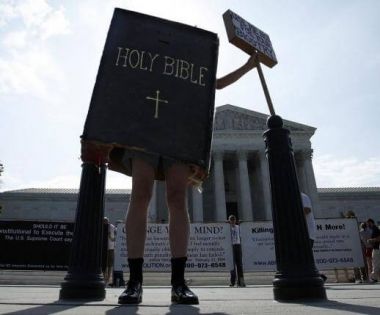Manual tells how Christian churches, schools can protect themselves from LGBT 'discrimination' lawsuits in US

The Southern Baptist Convention and the Alliance Defending Freedom (ADF) have released a manual which contains instructions on how churches, Christian schools and Christian ministries can protect themselves from potential sexual-orientation and gender identity lawsuits in the United States.
The manual, called "Protecting Your Ministry from Sexual Orientation, Gender Identity Lawsuits," details what religious organisations can do so they do not fall foul of LGBT activists. The potential for lawsuits has been heightened in recent years as LGBT activists demand further rights in the name of "equality" where as religious organisations look to protect their religious freedoms and seek not to be forced to conduct their work in a way that contradicts their long-held beliefs and faith.
The manual indicates that in recent times, the demand by activists for sexual liberty has been trumping calls to protect religious freedom, and this is having a dramatic affect on how churches, ministries and individual Christians need to conduct themselves in the US to ensure they are not the subject of a lawsuit claiming discrimination.
"This concept [of sexual liberty trumping religious freedom] has led to the passage of sexual orientation, gender identity ordinances (SOGIs)," the manual states, adding that these ordinances "elevate sexual special interests over our cherished fundamental freedoms, especially religious freedom."
It states that the ordinances place sexual orientation and gender identity in the same category as race or religion "to legally compel Christians to accept, endorse, and even promote messages, ideas, and events that violate their faith."
"And no ministry will remain immune if they remain true to Scripture's teachings about sexuality and gender," the manual's introduction says.
It details how Christian organisations can avoid discrimination suits by establishing clear rules in employment, schools and churches, and by ensuring employees and members sign a statement of faith.
Establishing religious employment criteria, use of facility, membership to churches and admission policies for Christian schools are also highlighted.
"Every church, Christian school, and Christian ministry should consider establishing religious criteria for its employees and volunteers," according to the manual, adding that US religious organisations may consider an applicant or employee's religious beliefs in hiring and firing.
It said under a known doctrine called ministerial exception "churches, Christian schools, and other organisations are exempt from employment non-discrimination laws for hiring and firing their ministerial employees—individuals who are tasked with performing the organisation's rituals or teaching and explaining its beliefs."
It also pointed out that adopting the First Amendment can protect employers "if they create and faithfully enforce religious employment criteria for every employee."
If feasible, it says, a religious organisation should assign its employees duties that involve ministerial, teaching or other spiritual qualifications that further the religious mission.
"For example, if a church receptionist answers the phone, the job description might detail how the receptionist is required to answer basic questions about the church's faith, provide religious resources, or pray with callers," the manual states.
These employees with some duties usually performed by a clergy are more likely to be viewed as "minister-like" by courts, it said.











